Analysing Organisational Behaviour: Culture, Motivation and Teams
VerifiedAdded on 2023/06/12
|16
|4667
|452
Report
AI Summary
This report provides a comprehensive analysis of organizational behaviour within the context of Sainsbury's, a multinational retailer. It examines how an organization's culture, politics, and power dynamics influence individual and team behaviour and performance. The report delves into content and process theories of motivation, exploring motivational techniques that enable effective goal achievement. It differentiates between effective and ineffective teams, critically analysing group development theories to discuss teamwork effectiveness. Furthermore, the report outlines the core concepts and philosophies of organizational behaviour, offering insights into how Sainsbury's can leverage these principles to enhance employee engagement, improve team collaboration, and ultimately drive organizational success. The analysis includes Handy's culture model, Jarrett's types of politics, and Vroom's expectancy theory, providing a well-rounded perspective on organizational dynamics.
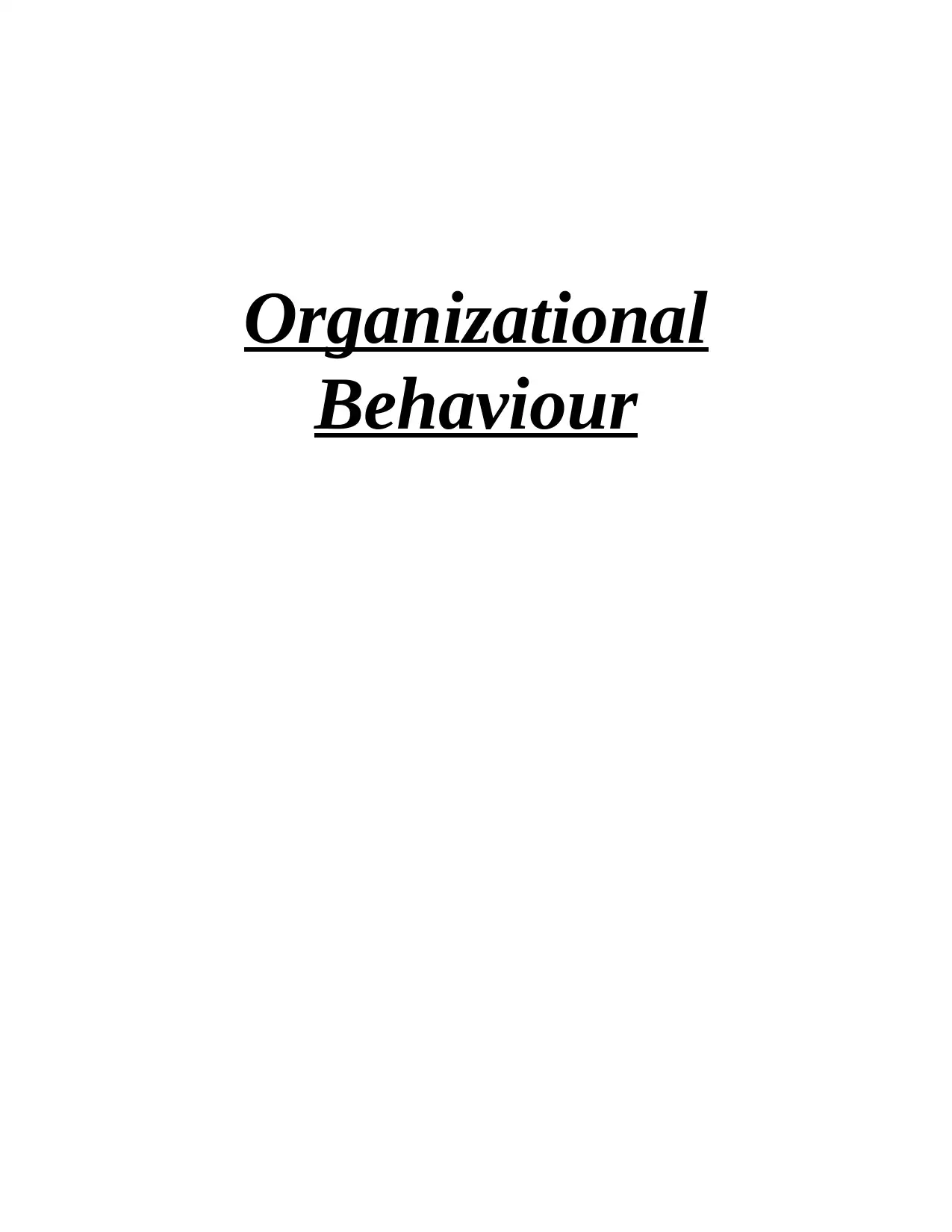
Organizational
Behaviour
Behaviour
Paraphrase This Document
Need a fresh take? Get an instant paraphrase of this document with our AI Paraphraser
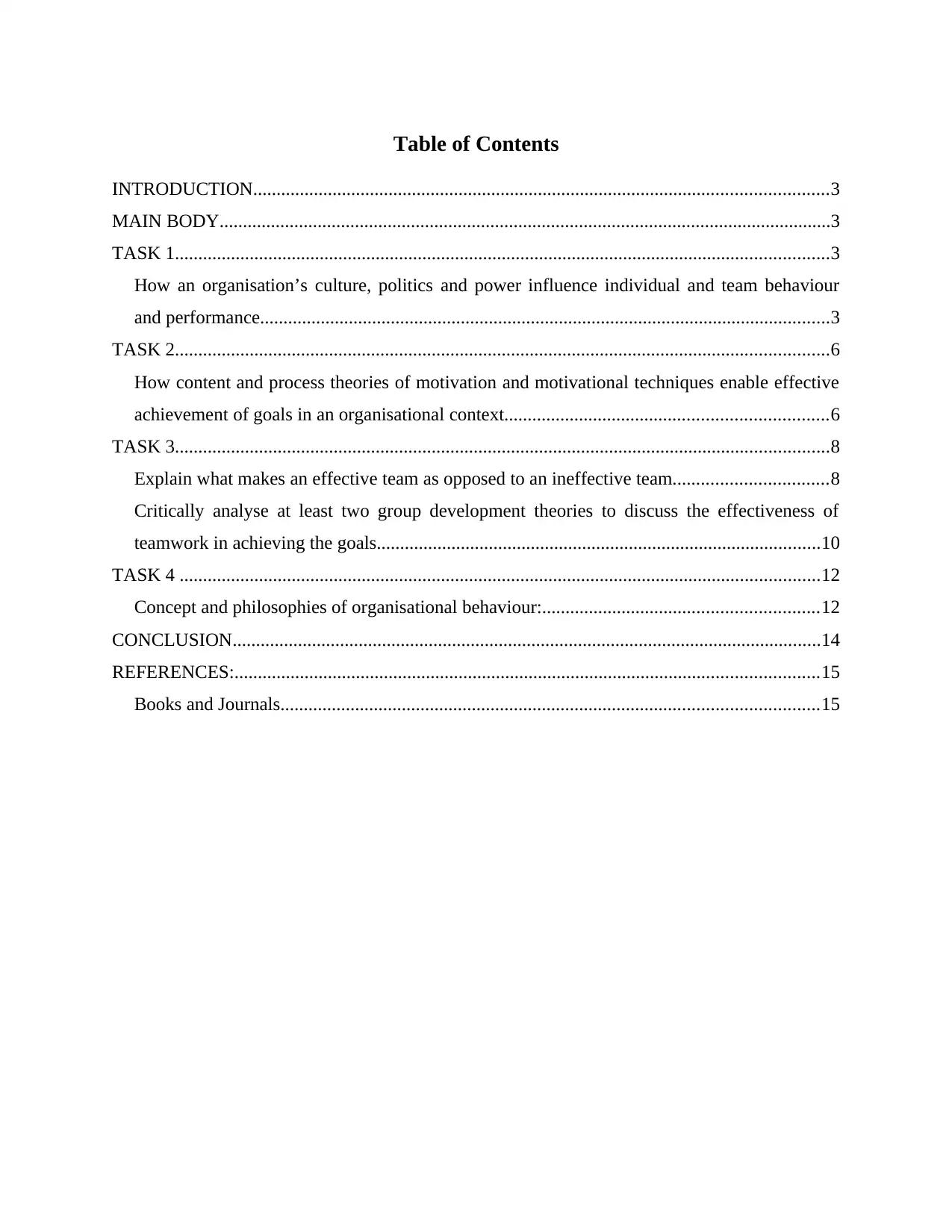
Table of Contents
INTRODUCTION...........................................................................................................................3
MAIN BODY...................................................................................................................................3
TASK 1............................................................................................................................................3
How an organisation’s culture, politics and power influence individual and team behaviour
and performance..........................................................................................................................3
TASK 2............................................................................................................................................6
How content and process theories of motivation and motivational techniques enable effective
achievement of goals in an organisational context.....................................................................6
TASK 3............................................................................................................................................8
Explain what makes an effective team as opposed to an ineffective team.................................8
Critically analyse at least two group development theories to discuss the effectiveness of
teamwork in achieving the goals...............................................................................................10
TASK 4 .........................................................................................................................................12
Concept and philosophies of organisational behaviour:...........................................................12
CONCLUSION..............................................................................................................................14
REFERENCES:.............................................................................................................................15
Books and Journals...................................................................................................................15
INTRODUCTION...........................................................................................................................3
MAIN BODY...................................................................................................................................3
TASK 1............................................................................................................................................3
How an organisation’s culture, politics and power influence individual and team behaviour
and performance..........................................................................................................................3
TASK 2............................................................................................................................................6
How content and process theories of motivation and motivational techniques enable effective
achievement of goals in an organisational context.....................................................................6
TASK 3............................................................................................................................................8
Explain what makes an effective team as opposed to an ineffective team.................................8
Critically analyse at least two group development theories to discuss the effectiveness of
teamwork in achieving the goals...............................................................................................10
TASK 4 .........................................................................................................................................12
Concept and philosophies of organisational behaviour:...........................................................12
CONCLUSION..............................................................................................................................14
REFERENCES:.............................................................................................................................15
Books and Journals...................................................................................................................15
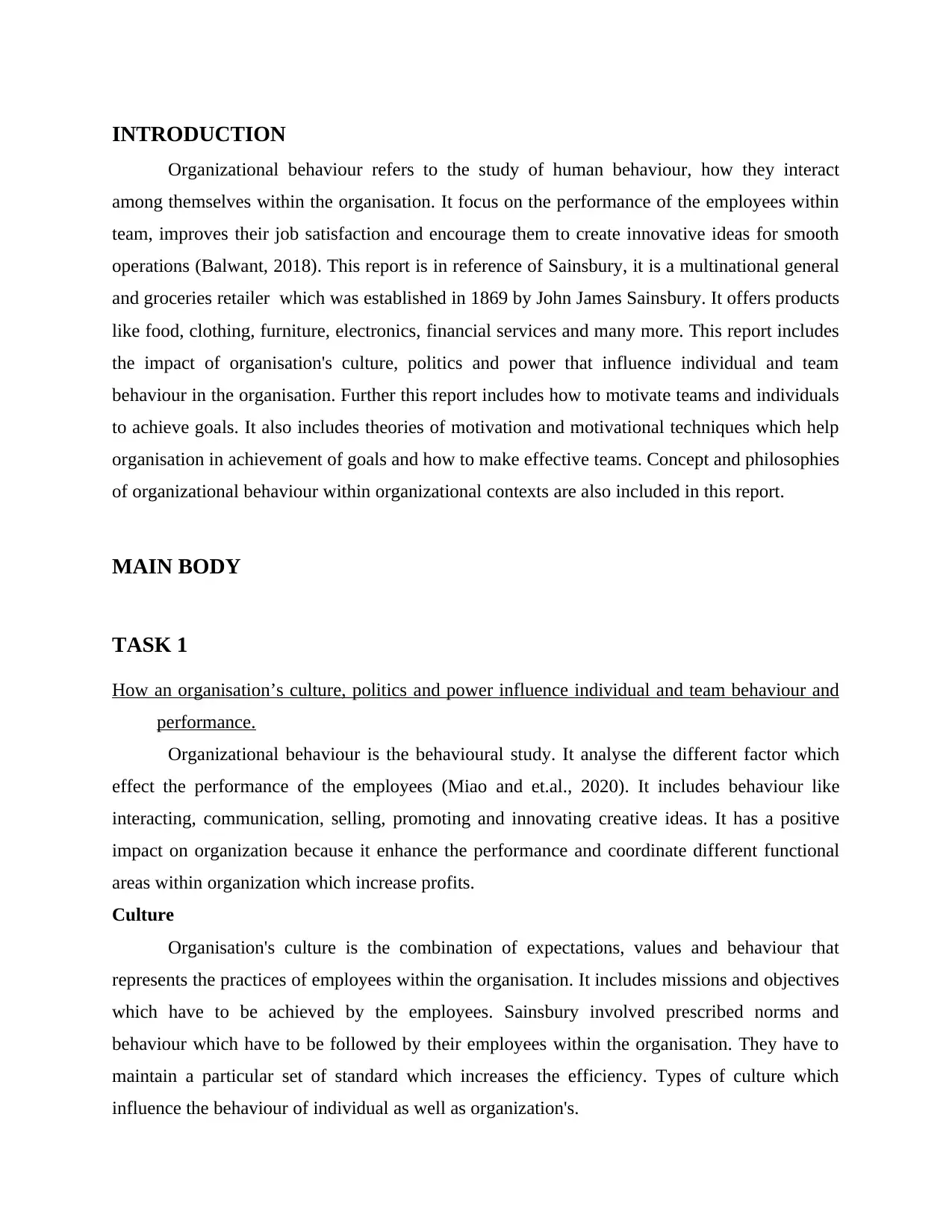
INTRODUCTION
Organizational behaviour refers to the study of human behaviour, how they interact
among themselves within the organisation. It focus on the performance of the employees within
team, improves their job satisfaction and encourage them to create innovative ideas for smooth
operations (Balwant, 2018). This report is in reference of Sainsbury, it is a multinational general
and groceries retailer which was established in 1869 by John James Sainsbury. It offers products
like food, clothing, furniture, electronics, financial services and many more. This report includes
the impact of organisation's culture, politics and power that influence individual and team
behaviour in the organisation. Further this report includes how to motivate teams and individuals
to achieve goals. It also includes theories of motivation and motivational techniques which help
organisation in achievement of goals and how to make effective teams. Concept and philosophies
of organizational behaviour within organizational contexts are also included in this report.
MAIN BODY
TASK 1
How an organisation’s culture, politics and power influence individual and team behaviour and
performance.
Organizational behaviour is the behavioural study. It analyse the different factor which
effect the performance of the employees (Miao and et.al., 2020). It includes behaviour like
interacting, communication, selling, promoting and innovating creative ideas. It has a positive
impact on organization because it enhance the performance and coordinate different functional
areas within organization which increase profits.
Culture
Organisation's culture is the combination of expectations, values and behaviour that
represents the practices of employees within the organisation. It includes missions and objectives
which have to be achieved by the employees. Sainsbury involved prescribed norms and
behaviour which have to be followed by their employees within the organisation. They have to
maintain a particular set of standard which increases the efficiency. Types of culture which
influence the behaviour of individual as well as organization's.
Organizational behaviour refers to the study of human behaviour, how they interact
among themselves within the organisation. It focus on the performance of the employees within
team, improves their job satisfaction and encourage them to create innovative ideas for smooth
operations (Balwant, 2018). This report is in reference of Sainsbury, it is a multinational general
and groceries retailer which was established in 1869 by John James Sainsbury. It offers products
like food, clothing, furniture, electronics, financial services and many more. This report includes
the impact of organisation's culture, politics and power that influence individual and team
behaviour in the organisation. Further this report includes how to motivate teams and individuals
to achieve goals. It also includes theories of motivation and motivational techniques which help
organisation in achievement of goals and how to make effective teams. Concept and philosophies
of organizational behaviour within organizational contexts are also included in this report.
MAIN BODY
TASK 1
How an organisation’s culture, politics and power influence individual and team behaviour and
performance.
Organizational behaviour is the behavioural study. It analyse the different factor which
effect the performance of the employees (Miao and et.al., 2020). It includes behaviour like
interacting, communication, selling, promoting and innovating creative ideas. It has a positive
impact on organization because it enhance the performance and coordinate different functional
areas within organization which increase profits.
Culture
Organisation's culture is the combination of expectations, values and behaviour that
represents the practices of employees within the organisation. It includes missions and objectives
which have to be achieved by the employees. Sainsbury involved prescribed norms and
behaviour which have to be followed by their employees within the organisation. They have to
maintain a particular set of standard which increases the efficiency. Types of culture which
influence the behaviour of individual as well as organization's.
⊘ This is a preview!⊘
Do you want full access?
Subscribe today to unlock all pages.

Trusted by 1+ million students worldwide
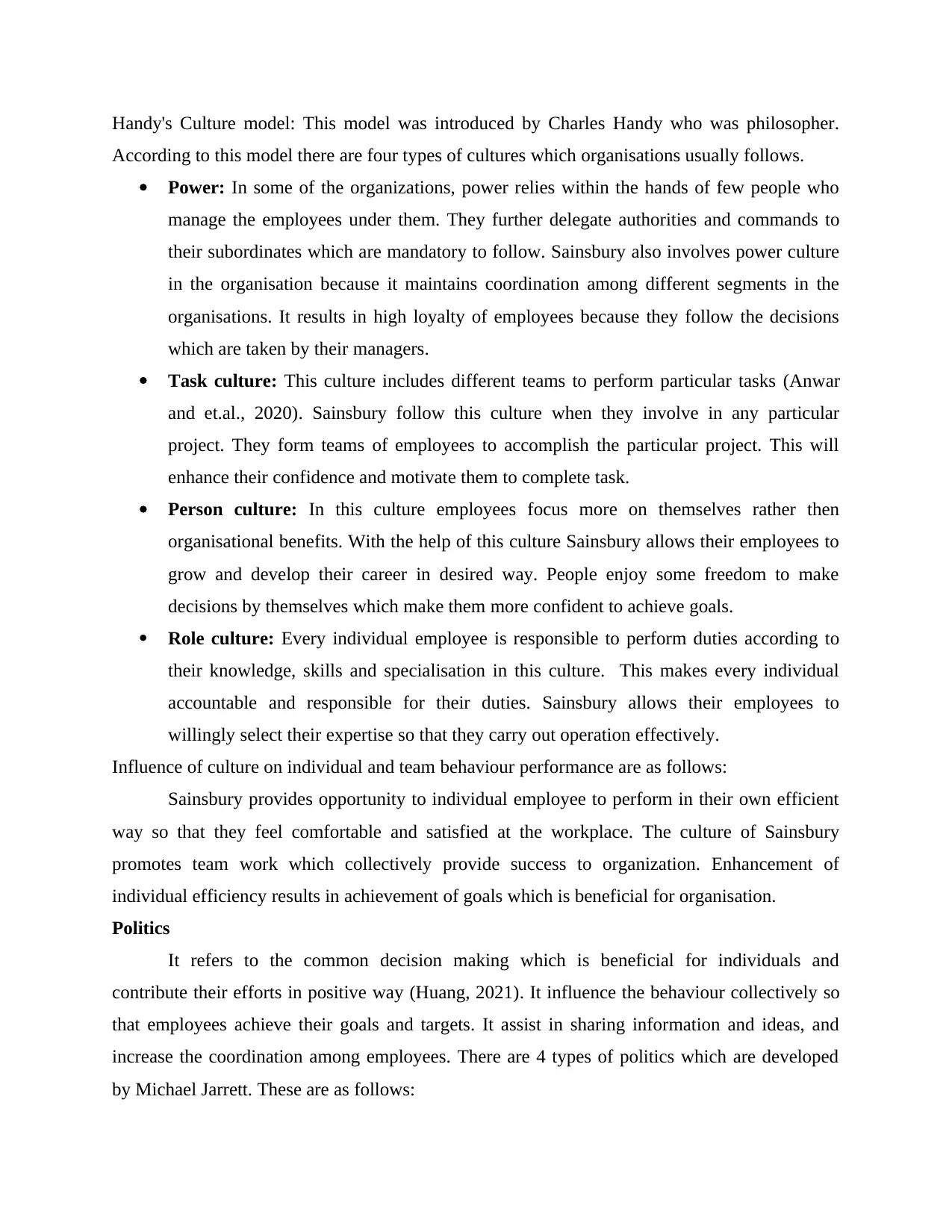
Handy's Culture model: This model was introduced by Charles Handy who was philosopher.
According to this model there are four types of cultures which organisations usually follows.
Power: In some of the organizations, power relies within the hands of few people who
manage the employees under them. They further delegate authorities and commands to
their subordinates which are mandatory to follow. Sainsbury also involves power culture
in the organisation because it maintains coordination among different segments in the
organisations. It results in high loyalty of employees because they follow the decisions
which are taken by their managers.
Task culture: This culture includes different teams to perform particular tasks (Anwar
and et.al., 2020). Sainsbury follow this culture when they involve in any particular
project. They form teams of employees to accomplish the particular project. This will
enhance their confidence and motivate them to complete task.
Person culture: In this culture employees focus more on themselves rather then
organisational benefits. With the help of this culture Sainsbury allows their employees to
grow and develop their career in desired way. People enjoy some freedom to make
decisions by themselves which make them more confident to achieve goals.
Role culture: Every individual employee is responsible to perform duties according to
their knowledge, skills and specialisation in this culture. This makes every individual
accountable and responsible for their duties. Sainsbury allows their employees to
willingly select their expertise so that they carry out operation effectively.
Influence of culture on individual and team behaviour performance are as follows:
Sainsbury provides opportunity to individual employee to perform in their own efficient
way so that they feel comfortable and satisfied at the workplace. The culture of Sainsbury
promotes team work which collectively provide success to organization. Enhancement of
individual efficiency results in achievement of goals which is beneficial for organisation.
Politics
It refers to the common decision making which is beneficial for individuals and
contribute their efforts in positive way (Huang, 2021). It influence the behaviour collectively so
that employees achieve their goals and targets. It assist in sharing information and ideas, and
increase the coordination among employees. There are 4 types of politics which are developed
by Michael Jarrett. These are as follows:
According to this model there are four types of cultures which organisations usually follows.
Power: In some of the organizations, power relies within the hands of few people who
manage the employees under them. They further delegate authorities and commands to
their subordinates which are mandatory to follow. Sainsbury also involves power culture
in the organisation because it maintains coordination among different segments in the
organisations. It results in high loyalty of employees because they follow the decisions
which are taken by their managers.
Task culture: This culture includes different teams to perform particular tasks (Anwar
and et.al., 2020). Sainsbury follow this culture when they involve in any particular
project. They form teams of employees to accomplish the particular project. This will
enhance their confidence and motivate them to complete task.
Person culture: In this culture employees focus more on themselves rather then
organisational benefits. With the help of this culture Sainsbury allows their employees to
grow and develop their career in desired way. People enjoy some freedom to make
decisions by themselves which make them more confident to achieve goals.
Role culture: Every individual employee is responsible to perform duties according to
their knowledge, skills and specialisation in this culture. This makes every individual
accountable and responsible for their duties. Sainsbury allows their employees to
willingly select their expertise so that they carry out operation effectively.
Influence of culture on individual and team behaviour performance are as follows:
Sainsbury provides opportunity to individual employee to perform in their own efficient
way so that they feel comfortable and satisfied at the workplace. The culture of Sainsbury
promotes team work which collectively provide success to organization. Enhancement of
individual efficiency results in achievement of goals which is beneficial for organisation.
Politics
It refers to the common decision making which is beneficial for individuals and
contribute their efforts in positive way (Huang, 2021). It influence the behaviour collectively so
that employees achieve their goals and targets. It assist in sharing information and ideas, and
increase the coordination among employees. There are 4 types of politics which are developed
by Michael Jarrett. These are as follows:
Paraphrase This Document
Need a fresh take? Get an instant paraphrase of this document with our AI Paraphraser
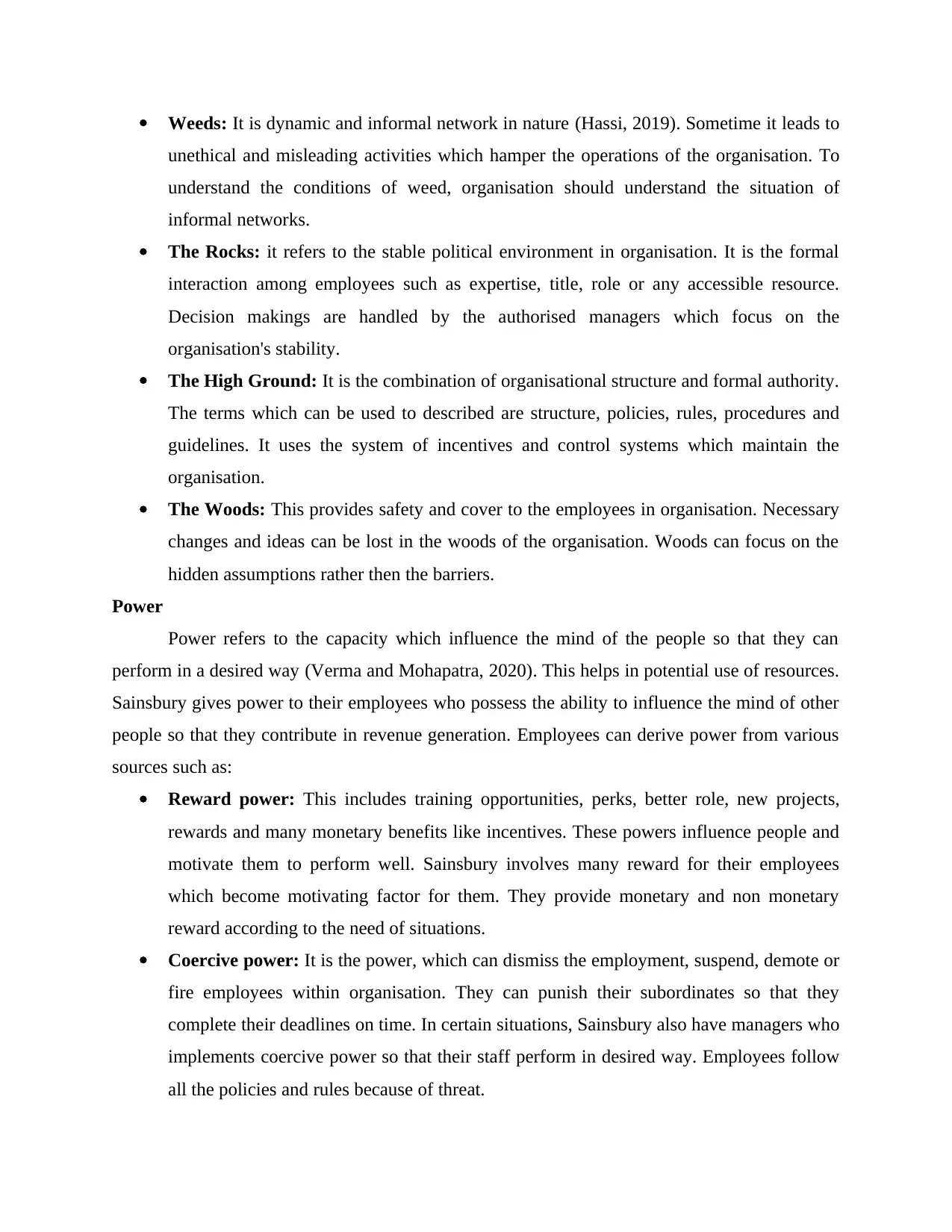
Weeds: It is dynamic and informal network in nature (Hassi, 2019). Sometime it leads to
unethical and misleading activities which hamper the operations of the organisation. To
understand the conditions of weed, organisation should understand the situation of
informal networks.
The Rocks: it refers to the stable political environment in organisation. It is the formal
interaction among employees such as expertise, title, role or any accessible resource.
Decision makings are handled by the authorised managers which focus on the
organisation's stability.
The High Ground: It is the combination of organisational structure and formal authority.
The terms which can be used to described are structure, policies, rules, procedures and
guidelines. It uses the system of incentives and control systems which maintain the
organisation.
The Woods: This provides safety and cover to the employees in organisation. Necessary
changes and ideas can be lost in the woods of the organisation. Woods can focus on the
hidden assumptions rather then the barriers.
Power
Power refers to the capacity which influence the mind of the people so that they can
perform in a desired way (Verma and Mohapatra, 2020). This helps in potential use of resources.
Sainsbury gives power to their employees who possess the ability to influence the mind of other
people so that they contribute in revenue generation. Employees can derive power from various
sources such as:
Reward power: This includes training opportunities, perks, better role, new projects,
rewards and many monetary benefits like incentives. These powers influence people and
motivate them to perform well. Sainsbury involves many reward for their employees
which become motivating factor for them. They provide monetary and non monetary
reward according to the need of situations.
Coercive power: It is the power, which can dismiss the employment, suspend, demote or
fire employees within organisation. They can punish their subordinates so that they
complete their deadlines on time. In certain situations, Sainsbury also have managers who
implements coercive power so that their staff perform in desired way. Employees follow
all the policies and rules because of threat.
unethical and misleading activities which hamper the operations of the organisation. To
understand the conditions of weed, organisation should understand the situation of
informal networks.
The Rocks: it refers to the stable political environment in organisation. It is the formal
interaction among employees such as expertise, title, role or any accessible resource.
Decision makings are handled by the authorised managers which focus on the
organisation's stability.
The High Ground: It is the combination of organisational structure and formal authority.
The terms which can be used to described are structure, policies, rules, procedures and
guidelines. It uses the system of incentives and control systems which maintain the
organisation.
The Woods: This provides safety and cover to the employees in organisation. Necessary
changes and ideas can be lost in the woods of the organisation. Woods can focus on the
hidden assumptions rather then the barriers.
Power
Power refers to the capacity which influence the mind of the people so that they can
perform in a desired way (Verma and Mohapatra, 2020). This helps in potential use of resources.
Sainsbury gives power to their employees who possess the ability to influence the mind of other
people so that they contribute in revenue generation. Employees can derive power from various
sources such as:
Reward power: This includes training opportunities, perks, better role, new projects,
rewards and many monetary benefits like incentives. These powers influence people and
motivate them to perform well. Sainsbury involves many reward for their employees
which become motivating factor for them. They provide monetary and non monetary
reward according to the need of situations.
Coercive power: It is the power, which can dismiss the employment, suspend, demote or
fire employees within organisation. They can punish their subordinates so that they
complete their deadlines on time. In certain situations, Sainsbury also have managers who
implements coercive power so that their staff perform in desired way. Employees follow
all the policies and rules because of threat.
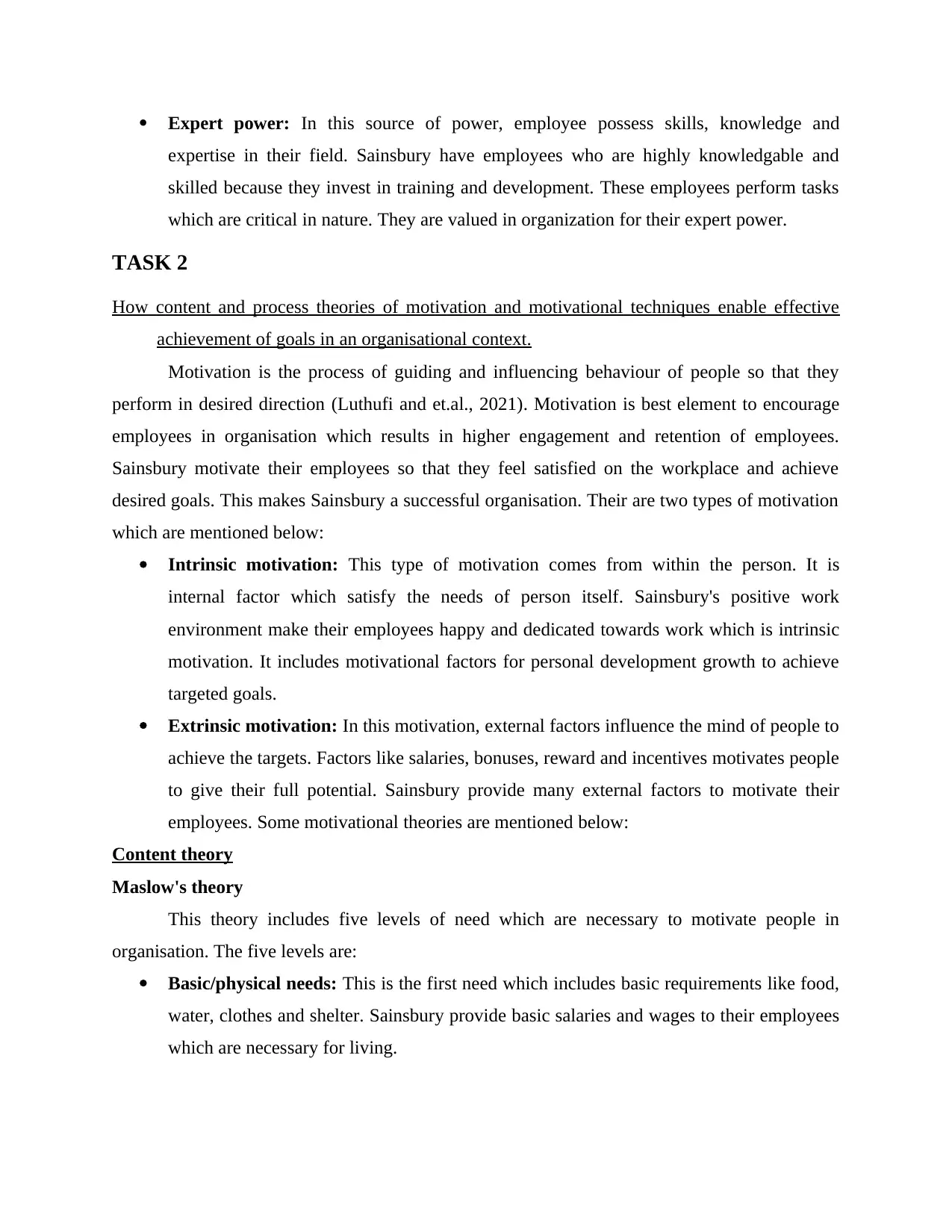
Expert power: In this source of power, employee possess skills, knowledge and
expertise in their field. Sainsbury have employees who are highly knowledgable and
skilled because they invest in training and development. These employees perform tasks
which are critical in nature. They are valued in organization for their expert power.
TASK 2
How content and process theories of motivation and motivational techniques enable effective
achievement of goals in an organisational context.
Motivation is the process of guiding and influencing behaviour of people so that they
perform in desired direction (Luthufi and et.al., 2021). Motivation is best element to encourage
employees in organisation which results in higher engagement and retention of employees.
Sainsbury motivate their employees so that they feel satisfied on the workplace and achieve
desired goals. This makes Sainsbury a successful organisation. Their are two types of motivation
which are mentioned below:
Intrinsic motivation: This type of motivation comes from within the person. It is
internal factor which satisfy the needs of person itself. Sainsbury's positive work
environment make their employees happy and dedicated towards work which is intrinsic
motivation. It includes motivational factors for personal development growth to achieve
targeted goals.
Extrinsic motivation: In this motivation, external factors influence the mind of people to
achieve the targets. Factors like salaries, bonuses, reward and incentives motivates people
to give their full potential. Sainsbury provide many external factors to motivate their
employees. Some motivational theories are mentioned below:
Content theory
Maslow's theory
This theory includes five levels of need which are necessary to motivate people in
organisation. The five levels are:
Basic/physical needs: This is the first need which includes basic requirements like food,
water, clothes and shelter. Sainsbury provide basic salaries and wages to their employees
which are necessary for living.
expertise in their field. Sainsbury have employees who are highly knowledgable and
skilled because they invest in training and development. These employees perform tasks
which are critical in nature. They are valued in organization for their expert power.
TASK 2
How content and process theories of motivation and motivational techniques enable effective
achievement of goals in an organisational context.
Motivation is the process of guiding and influencing behaviour of people so that they
perform in desired direction (Luthufi and et.al., 2021). Motivation is best element to encourage
employees in organisation which results in higher engagement and retention of employees.
Sainsbury motivate their employees so that they feel satisfied on the workplace and achieve
desired goals. This makes Sainsbury a successful organisation. Their are two types of motivation
which are mentioned below:
Intrinsic motivation: This type of motivation comes from within the person. It is
internal factor which satisfy the needs of person itself. Sainsbury's positive work
environment make their employees happy and dedicated towards work which is intrinsic
motivation. It includes motivational factors for personal development growth to achieve
targeted goals.
Extrinsic motivation: In this motivation, external factors influence the mind of people to
achieve the targets. Factors like salaries, bonuses, reward and incentives motivates people
to give their full potential. Sainsbury provide many external factors to motivate their
employees. Some motivational theories are mentioned below:
Content theory
Maslow's theory
This theory includes five levels of need which are necessary to motivate people in
organisation. The five levels are:
Basic/physical needs: This is the first need which includes basic requirements like food,
water, clothes and shelter. Sainsbury provide basic salaries and wages to their employees
which are necessary for living.
⊘ This is a preview!⊘
Do you want full access?
Subscribe today to unlock all pages.

Trusted by 1+ million students worldwide
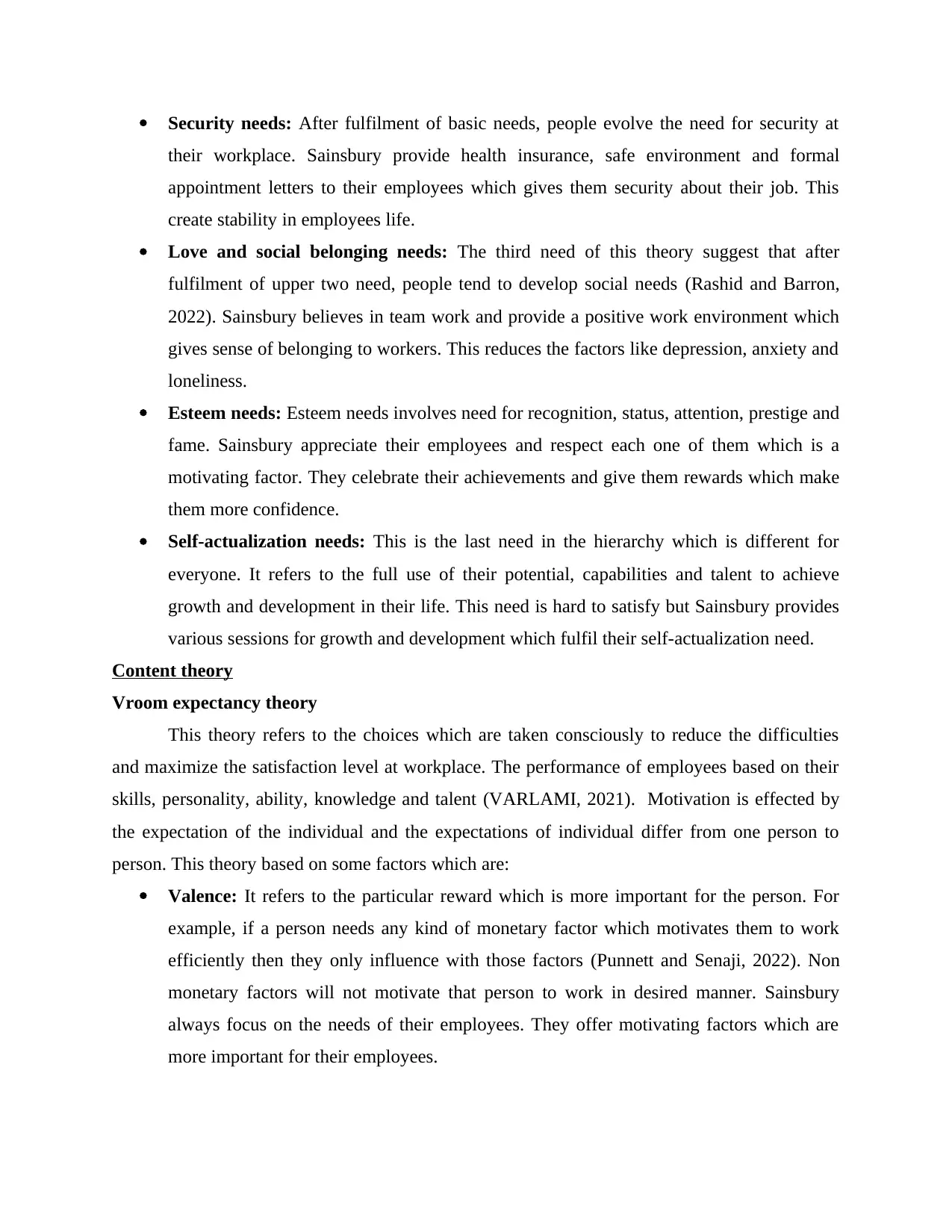
Security needs: After fulfilment of basic needs, people evolve the need for security at
their workplace. Sainsbury provide health insurance, safe environment and formal
appointment letters to their employees which gives them security about their job. This
create stability in employees life.
Love and social belonging needs: The third need of this theory suggest that after
fulfilment of upper two need, people tend to develop social needs (Rashid and Barron,
2022). Sainsbury believes in team work and provide a positive work environment which
gives sense of belonging to workers. This reduces the factors like depression, anxiety and
loneliness.
Esteem needs: Esteem needs involves need for recognition, status, attention, prestige and
fame. Sainsbury appreciate their employees and respect each one of them which is a
motivating factor. They celebrate their achievements and give them rewards which make
them more confidence.
Self-actualization needs: This is the last need in the hierarchy which is different for
everyone. It refers to the full use of their potential, capabilities and talent to achieve
growth and development in their life. This need is hard to satisfy but Sainsbury provides
various sessions for growth and development which fulfil their self-actualization need.
Content theory
Vroom expectancy theory
This theory refers to the choices which are taken consciously to reduce the difficulties
and maximize the satisfaction level at workplace. The performance of employees based on their
skills, personality, ability, knowledge and talent (VARLAMI, 2021). Motivation is effected by
the expectation of the individual and the expectations of individual differ from one person to
person. This theory based on some factors which are:
Valence: It refers to the particular reward which is more important for the person. For
example, if a person needs any kind of monetary factor which motivates them to work
efficiently then they only influence with those factors (Punnett and Senaji, 2022). Non
monetary factors will not motivate that person to work in desired manner. Sainsbury
always focus on the needs of their employees. They offer motivating factors which are
more important for their employees.
their workplace. Sainsbury provide health insurance, safe environment and formal
appointment letters to their employees which gives them security about their job. This
create stability in employees life.
Love and social belonging needs: The third need of this theory suggest that after
fulfilment of upper two need, people tend to develop social needs (Rashid and Barron,
2022). Sainsbury believes in team work and provide a positive work environment which
gives sense of belonging to workers. This reduces the factors like depression, anxiety and
loneliness.
Esteem needs: Esteem needs involves need for recognition, status, attention, prestige and
fame. Sainsbury appreciate their employees and respect each one of them which is a
motivating factor. They celebrate their achievements and give them rewards which make
them more confidence.
Self-actualization needs: This is the last need in the hierarchy which is different for
everyone. It refers to the full use of their potential, capabilities and talent to achieve
growth and development in their life. This need is hard to satisfy but Sainsbury provides
various sessions for growth and development which fulfil their self-actualization need.
Content theory
Vroom expectancy theory
This theory refers to the choices which are taken consciously to reduce the difficulties
and maximize the satisfaction level at workplace. The performance of employees based on their
skills, personality, ability, knowledge and talent (VARLAMI, 2021). Motivation is effected by
the expectation of the individual and the expectations of individual differ from one person to
person. This theory based on some factors which are:
Valence: It refers to the particular reward which is more important for the person. For
example, if a person needs any kind of monetary factor which motivates them to work
efficiently then they only influence with those factors (Punnett and Senaji, 2022). Non
monetary factors will not motivate that person to work in desired manner. Sainsbury
always focus on the needs of their employees. They offer motivating factors which are
more important for their employees.
Paraphrase This Document
Need a fresh take? Get an instant paraphrase of this document with our AI Paraphraser
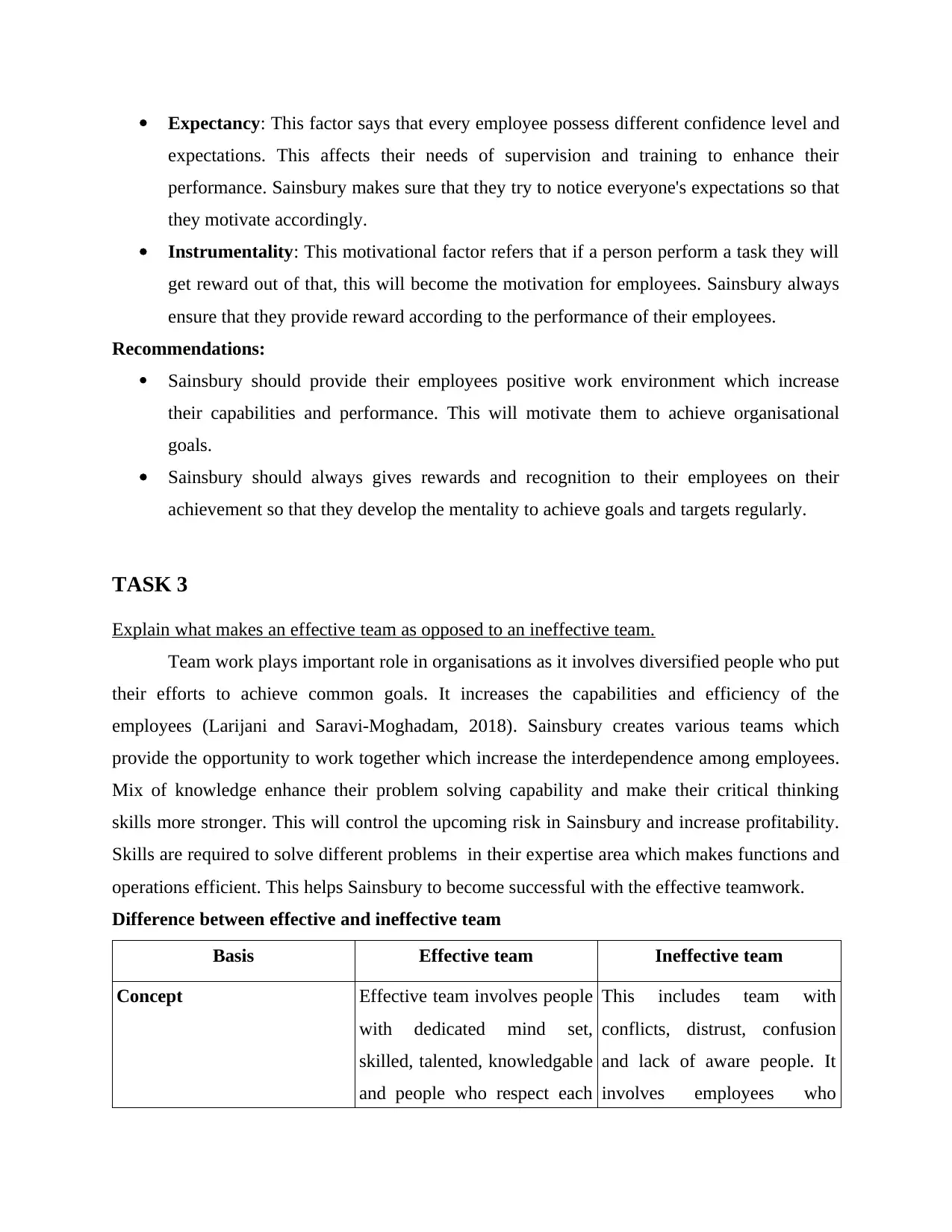
Expectancy: This factor says that every employee possess different confidence level and
expectations. This affects their needs of supervision and training to enhance their
performance. Sainsbury makes sure that they try to notice everyone's expectations so that
they motivate accordingly.
Instrumentality: This motivational factor refers that if a person perform a task they will
get reward out of that, this will become the motivation for employees. Sainsbury always
ensure that they provide reward according to the performance of their employees.
Recommendations:
Sainsbury should provide their employees positive work environment which increase
their capabilities and performance. This will motivate them to achieve organisational
goals.
Sainsbury should always gives rewards and recognition to their employees on their
achievement so that they develop the mentality to achieve goals and targets regularly.
TASK 3
Explain what makes an effective team as opposed to an ineffective team.
Team work plays important role in organisations as it involves diversified people who put
their efforts to achieve common goals. It increases the capabilities and efficiency of the
employees (Larijani and Saravi-Moghadam, 2018). Sainsbury creates various teams which
provide the opportunity to work together which increase the interdependence among employees.
Mix of knowledge enhance their problem solving capability and make their critical thinking
skills more stronger. This will control the upcoming risk in Sainsbury and increase profitability.
Skills are required to solve different problems in their expertise area which makes functions and
operations efficient. This helps Sainsbury to become successful with the effective teamwork.
Difference between effective and ineffective team
Basis Effective team Ineffective team
Concept Effective team involves people
with dedicated mind set,
skilled, talented, knowledgable
and people who respect each
This includes team with
conflicts, distrust, confusion
and lack of aware people. It
involves employees who
expectations. This affects their needs of supervision and training to enhance their
performance. Sainsbury makes sure that they try to notice everyone's expectations so that
they motivate accordingly.
Instrumentality: This motivational factor refers that if a person perform a task they will
get reward out of that, this will become the motivation for employees. Sainsbury always
ensure that they provide reward according to the performance of their employees.
Recommendations:
Sainsbury should provide their employees positive work environment which increase
their capabilities and performance. This will motivate them to achieve organisational
goals.
Sainsbury should always gives rewards and recognition to their employees on their
achievement so that they develop the mentality to achieve goals and targets regularly.
TASK 3
Explain what makes an effective team as opposed to an ineffective team.
Team work plays important role in organisations as it involves diversified people who put
their efforts to achieve common goals. It increases the capabilities and efficiency of the
employees (Larijani and Saravi-Moghadam, 2018). Sainsbury creates various teams which
provide the opportunity to work together which increase the interdependence among employees.
Mix of knowledge enhance their problem solving capability and make their critical thinking
skills more stronger. This will control the upcoming risk in Sainsbury and increase profitability.
Skills are required to solve different problems in their expertise area which makes functions and
operations efficient. This helps Sainsbury to become successful with the effective teamwork.
Difference between effective and ineffective team
Basis Effective team Ineffective team
Concept Effective team involves people
with dedicated mind set,
skilled, talented, knowledgable
and people who respect each
This includes team with
conflicts, distrust, confusion
and lack of aware people. It
involves employees who
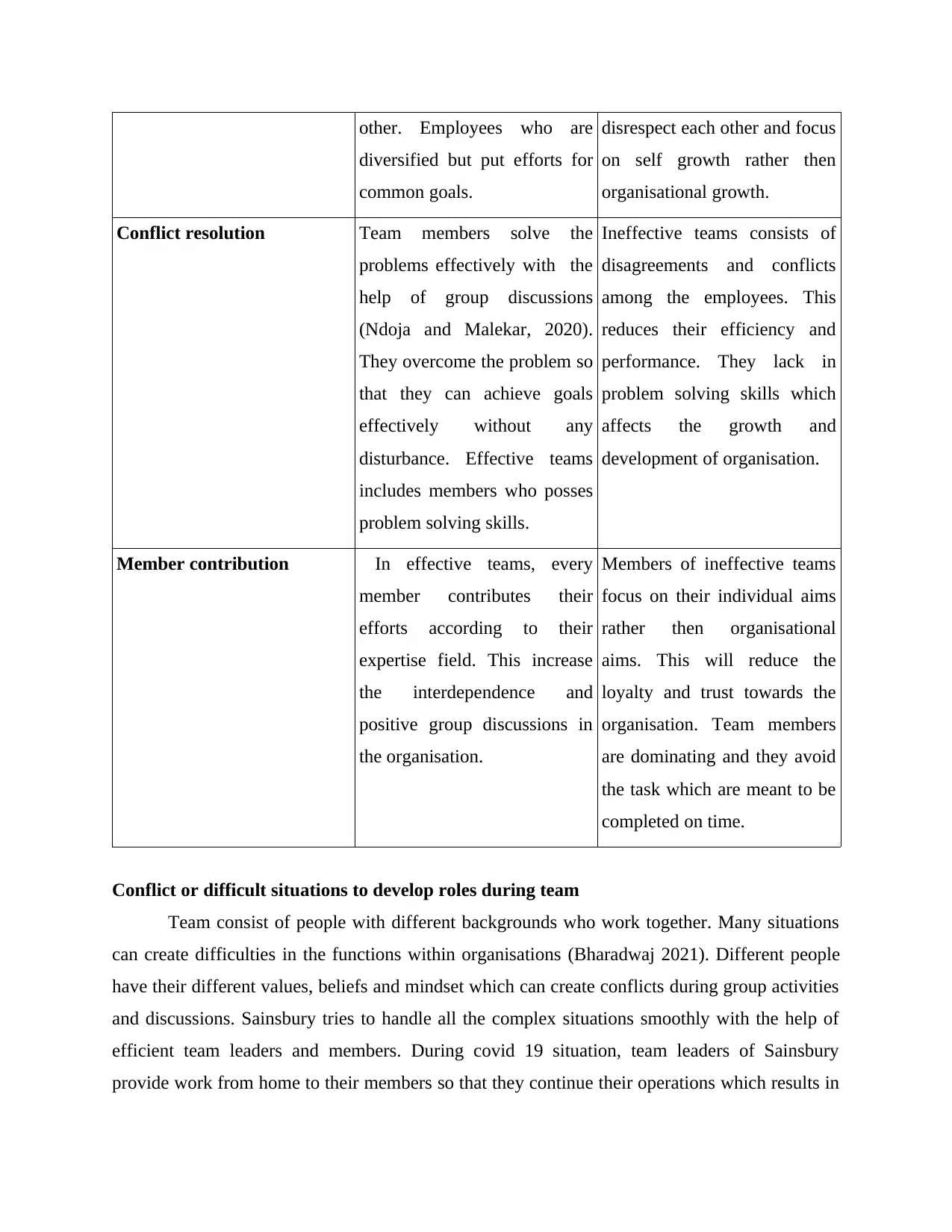
other. Employees who are
diversified but put efforts for
common goals.
disrespect each other and focus
on self growth rather then
organisational growth.
Conflict resolution Team members solve the
problems effectively with the
help of group discussions
(Ndoja and Malekar, 2020).
They overcome the problem so
that they can achieve goals
effectively without any
disturbance. Effective teams
includes members who posses
problem solving skills.
Ineffective teams consists of
disagreements and conflicts
among the employees. This
reduces their efficiency and
performance. They lack in
problem solving skills which
affects the growth and
development of organisation.
Member contribution In effective teams, every
member contributes their
efforts according to their
expertise field. This increase
the interdependence and
positive group discussions in
the organisation.
Members of ineffective teams
focus on their individual aims
rather then organisational
aims. This will reduce the
loyalty and trust towards the
organisation. Team members
are dominating and they avoid
the task which are meant to be
completed on time.
Conflict or difficult situations to develop roles during team
Team consist of people with different backgrounds who work together. Many situations
can create difficulties in the functions within organisations (Bharadwaj 2021). Different people
have their different values, beliefs and mindset which can create conflicts during group activities
and discussions. Sainsbury tries to handle all the complex situations smoothly with the help of
efficient team leaders and members. During covid 19 situation, team leaders of Sainsbury
provide work from home to their members so that they continue their operations which results in
diversified but put efforts for
common goals.
disrespect each other and focus
on self growth rather then
organisational growth.
Conflict resolution Team members solve the
problems effectively with the
help of group discussions
(Ndoja and Malekar, 2020).
They overcome the problem so
that they can achieve goals
effectively without any
disturbance. Effective teams
includes members who posses
problem solving skills.
Ineffective teams consists of
disagreements and conflicts
among the employees. This
reduces their efficiency and
performance. They lack in
problem solving skills which
affects the growth and
development of organisation.
Member contribution In effective teams, every
member contributes their
efforts according to their
expertise field. This increase
the interdependence and
positive group discussions in
the organisation.
Members of ineffective teams
focus on their individual aims
rather then organisational
aims. This will reduce the
loyalty and trust towards the
organisation. Team members
are dominating and they avoid
the task which are meant to be
completed on time.
Conflict or difficult situations to develop roles during team
Team consist of people with different backgrounds who work together. Many situations
can create difficulties in the functions within organisations (Bharadwaj 2021). Different people
have their different values, beliefs and mindset which can create conflicts during group activities
and discussions. Sainsbury tries to handle all the complex situations smoothly with the help of
efficient team leaders and members. During covid 19 situation, team leaders of Sainsbury
provide work from home to their members so that they continue their operations which results in
⊘ This is a preview!⊘
Do you want full access?
Subscribe today to unlock all pages.

Trusted by 1+ million students worldwide
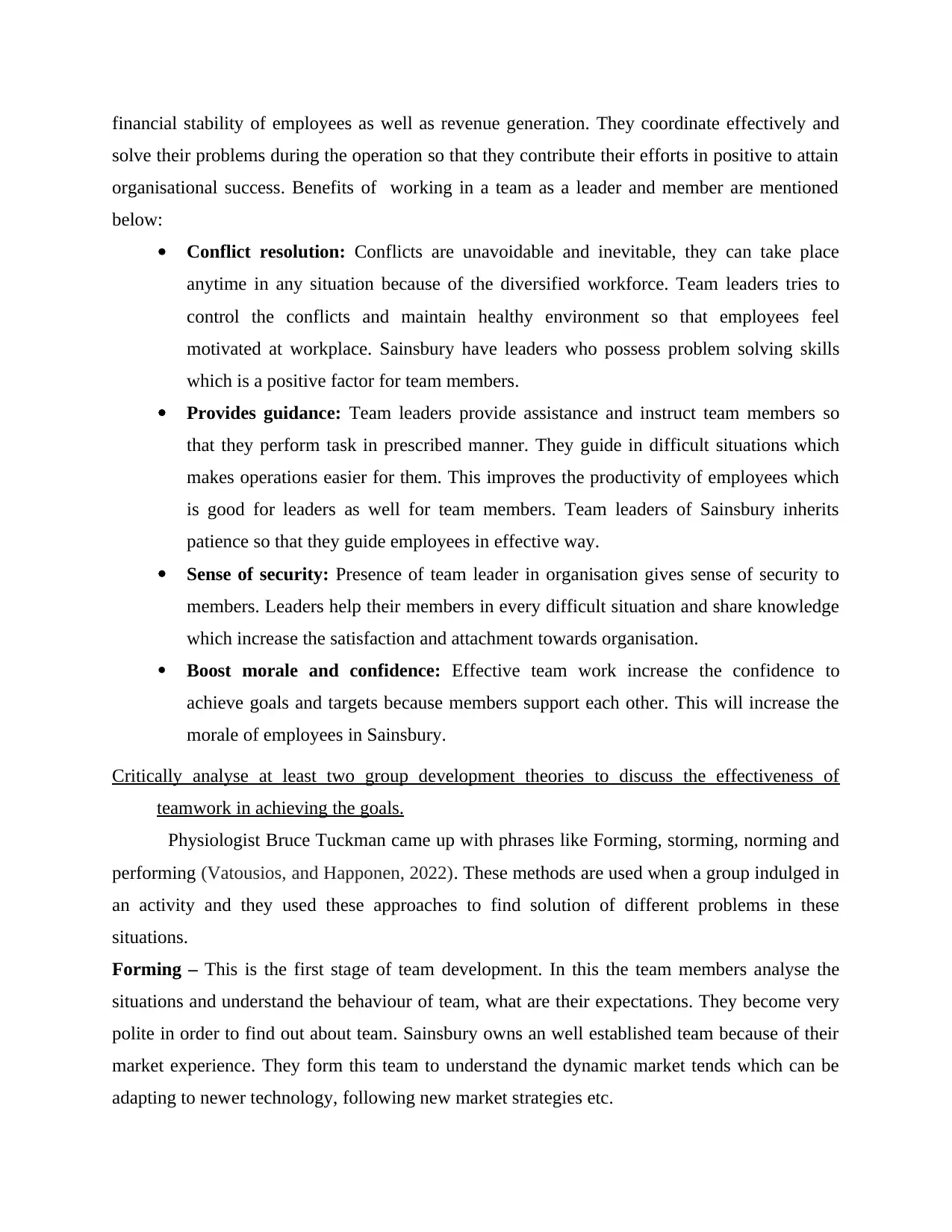
financial stability of employees as well as revenue generation. They coordinate effectively and
solve their problems during the operation so that they contribute their efforts in positive to attain
organisational success. Benefits of working in a team as a leader and member are mentioned
below:
Conflict resolution: Conflicts are unavoidable and inevitable, they can take place
anytime in any situation because of the diversified workforce. Team leaders tries to
control the conflicts and maintain healthy environment so that employees feel
motivated at workplace. Sainsbury have leaders who possess problem solving skills
which is a positive factor for team members.
Provides guidance: Team leaders provide assistance and instruct team members so
that they perform task in prescribed manner. They guide in difficult situations which
makes operations easier for them. This improves the productivity of employees which
is good for leaders as well for team members. Team leaders of Sainsbury inherits
patience so that they guide employees in effective way.
Sense of security: Presence of team leader in organisation gives sense of security to
members. Leaders help their members in every difficult situation and share knowledge
which increase the satisfaction and attachment towards organisation.
Boost morale and confidence: Effective team work increase the confidence to
achieve goals and targets because members support each other. This will increase the
morale of employees in Sainsbury.
Critically analyse at least two group development theories to discuss the effectiveness of
teamwork in achieving the goals.
Physiologist Bruce Tuckman came up with phrases like Forming, storming, norming and
performing (Vatousios, and Happonen, 2022). These methods are used when a group indulged in
an activity and they used these approaches to find solution of different problems in these
situations.
Forming – This is the first stage of team development. In this the team members analyse the
situations and understand the behaviour of team, what are their expectations. They become very
polite in order to find out about team. Sainsbury owns an well established team because of their
market experience. They form this team to understand the dynamic market tends which can be
adapting to newer technology, following new market strategies etc.
solve their problems during the operation so that they contribute their efforts in positive to attain
organisational success. Benefits of working in a team as a leader and member are mentioned
below:
Conflict resolution: Conflicts are unavoidable and inevitable, they can take place
anytime in any situation because of the diversified workforce. Team leaders tries to
control the conflicts and maintain healthy environment so that employees feel
motivated at workplace. Sainsbury have leaders who possess problem solving skills
which is a positive factor for team members.
Provides guidance: Team leaders provide assistance and instruct team members so
that they perform task in prescribed manner. They guide in difficult situations which
makes operations easier for them. This improves the productivity of employees which
is good for leaders as well for team members. Team leaders of Sainsbury inherits
patience so that they guide employees in effective way.
Sense of security: Presence of team leader in organisation gives sense of security to
members. Leaders help their members in every difficult situation and share knowledge
which increase the satisfaction and attachment towards organisation.
Boost morale and confidence: Effective team work increase the confidence to
achieve goals and targets because members support each other. This will increase the
morale of employees in Sainsbury.
Critically analyse at least two group development theories to discuss the effectiveness of
teamwork in achieving the goals.
Physiologist Bruce Tuckman came up with phrases like Forming, storming, norming and
performing (Vatousios, and Happonen, 2022). These methods are used when a group indulged in
an activity and they used these approaches to find solution of different problems in these
situations.
Forming – This is the first stage of team development. In this the team members analyse the
situations and understand the behaviour of team, what are their expectations. They become very
polite in order to find out about team. Sainsbury owns an well established team because of their
market experience. They form this team to understand the dynamic market tends which can be
adapting to newer technology, following new market strategies etc.
Paraphrase This Document
Need a fresh take? Get an instant paraphrase of this document with our AI Paraphraser
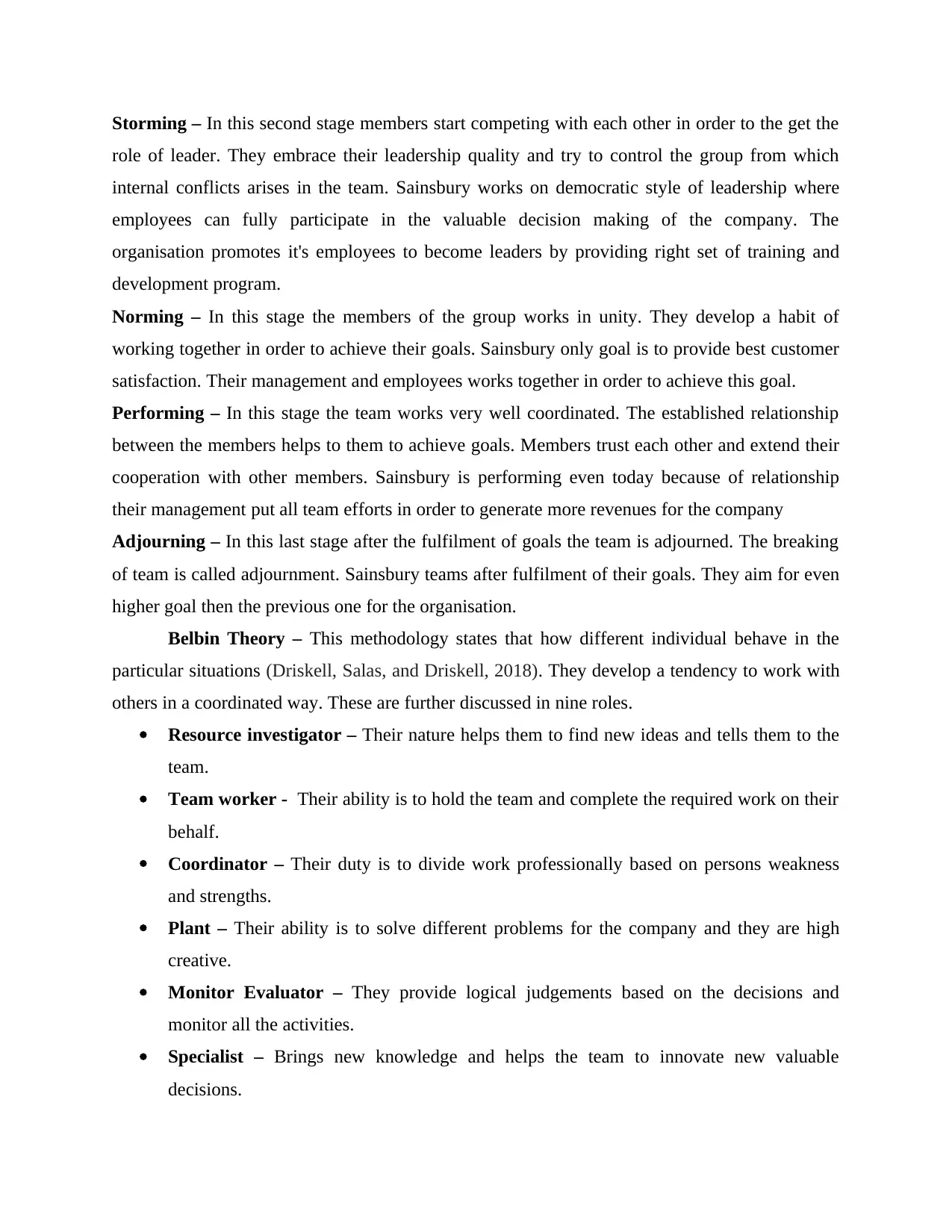
Storming – In this second stage members start competing with each other in order to the get the
role of leader. They embrace their leadership quality and try to control the group from which
internal conflicts arises in the team. Sainsbury works on democratic style of leadership where
employees can fully participate in the valuable decision making of the company. The
organisation promotes it's employees to become leaders by providing right set of training and
development program.
Norming – In this stage the members of the group works in unity. They develop a habit of
working together in order to achieve their goals. Sainsbury only goal is to provide best customer
satisfaction. Their management and employees works together in order to achieve this goal.
Performing – In this stage the team works very well coordinated. The established relationship
between the members helps to them to achieve goals. Members trust each other and extend their
cooperation with other members. Sainsbury is performing even today because of relationship
their management put all team efforts in order to generate more revenues for the company
Adjourning – In this last stage after the fulfilment of goals the team is adjourned. The breaking
of team is called adjournment. Sainsbury teams after fulfilment of their goals. They aim for even
higher goal then the previous one for the organisation.
Belbin Theory – This methodology states that how different individual behave in the
particular situations (Driskell, Salas, and Driskell, 2018). They develop a tendency to work with
others in a coordinated way. These are further discussed in nine roles.
Resource investigator – Their nature helps them to find new ideas and tells them to the
team.
Team worker - Their ability is to hold the team and complete the required work on their
behalf.
Coordinator – Their duty is to divide work professionally based on persons weakness
and strengths.
Plant – Their ability is to solve different problems for the company and they are high
creative.
Monitor Evaluator – They provide logical judgements based on the decisions and
monitor all the activities.
Specialist – Brings new knowledge and helps the team to innovate new valuable
decisions.
role of leader. They embrace their leadership quality and try to control the group from which
internal conflicts arises in the team. Sainsbury works on democratic style of leadership where
employees can fully participate in the valuable decision making of the company. The
organisation promotes it's employees to become leaders by providing right set of training and
development program.
Norming – In this stage the members of the group works in unity. They develop a habit of
working together in order to achieve their goals. Sainsbury only goal is to provide best customer
satisfaction. Their management and employees works together in order to achieve this goal.
Performing – In this stage the team works very well coordinated. The established relationship
between the members helps to them to achieve goals. Members trust each other and extend their
cooperation with other members. Sainsbury is performing even today because of relationship
their management put all team efforts in order to generate more revenues for the company
Adjourning – In this last stage after the fulfilment of goals the team is adjourned. The breaking
of team is called adjournment. Sainsbury teams after fulfilment of their goals. They aim for even
higher goal then the previous one for the organisation.
Belbin Theory – This methodology states that how different individual behave in the
particular situations (Driskell, Salas, and Driskell, 2018). They develop a tendency to work with
others in a coordinated way. These are further discussed in nine roles.
Resource investigator – Their nature helps them to find new ideas and tells them to the
team.
Team worker - Their ability is to hold the team and complete the required work on their
behalf.
Coordinator – Their duty is to divide work professionally based on persons weakness
and strengths.
Plant – Their ability is to solve different problems for the company and they are high
creative.
Monitor Evaluator – They provide logical judgements based on the decisions and
monitor all the activities.
Specialist – Brings new knowledge and helps the team to innovate new valuable
decisions.
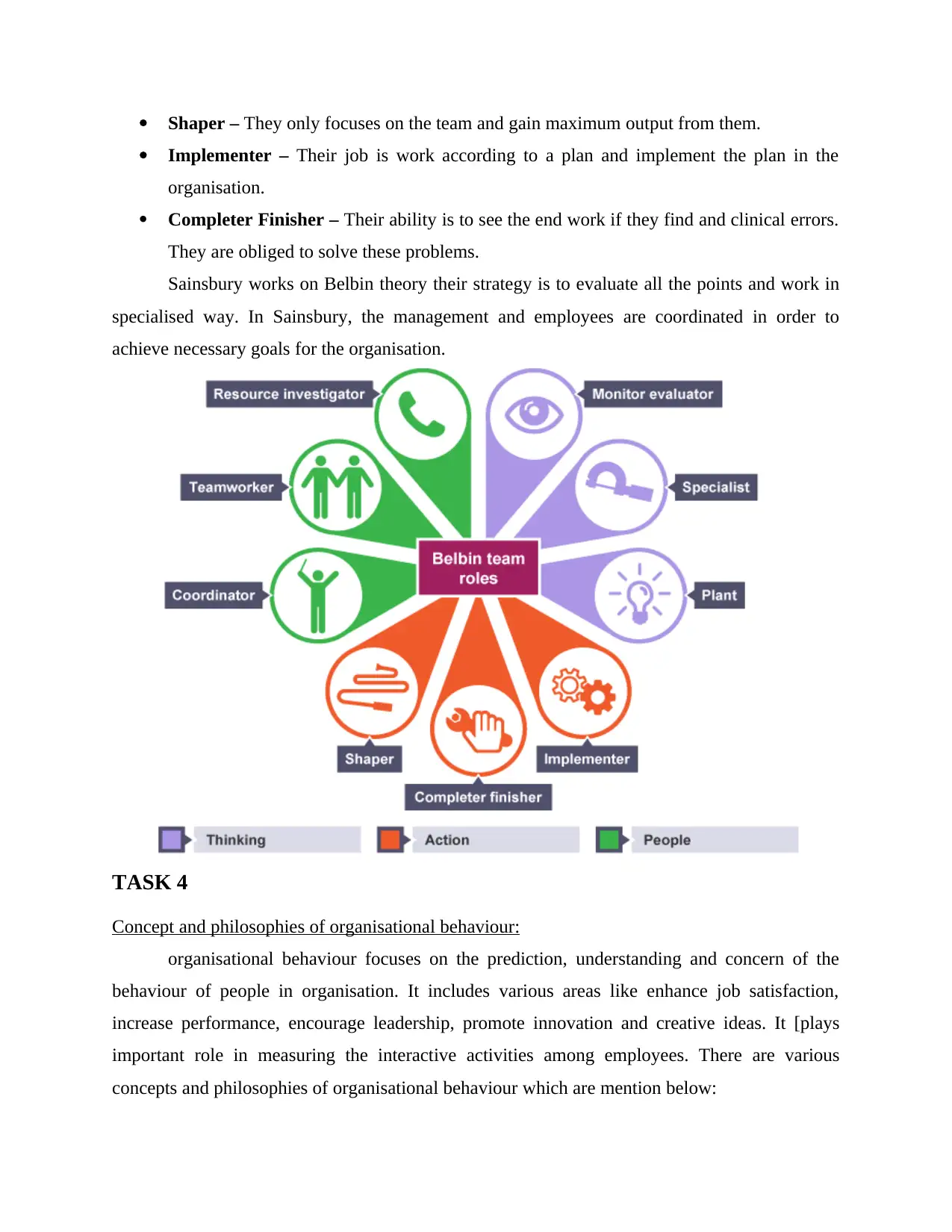
Shaper – They only focuses on the team and gain maximum output from them.
Implementer – Their job is work according to a plan and implement the plan in the
organisation.
Completer Finisher – Their ability is to see the end work if they find and clinical errors.
They are obliged to solve these problems.
Sainsbury works on Belbin theory their strategy is to evaluate all the points and work in
specialised way. In Sainsbury, the management and employees are coordinated in order to
achieve necessary goals for the organisation.
TASK 4
Concept and philosophies of organisational behaviour:
organisational behaviour focuses on the prediction, understanding and concern of the
behaviour of people in organisation. It includes various areas like enhance job satisfaction,
increase performance, encourage leadership, promote innovation and creative ideas. It [plays
important role in measuring the interactive activities among employees. There are various
concepts and philosophies of organisational behaviour which are mention below:
Implementer – Their job is work according to a plan and implement the plan in the
organisation.
Completer Finisher – Their ability is to see the end work if they find and clinical errors.
They are obliged to solve these problems.
Sainsbury works on Belbin theory their strategy is to evaluate all the points and work in
specialised way. In Sainsbury, the management and employees are coordinated in order to
achieve necessary goals for the organisation.
TASK 4
Concept and philosophies of organisational behaviour:
organisational behaviour focuses on the prediction, understanding and concern of the
behaviour of people in organisation. It includes various areas like enhance job satisfaction,
increase performance, encourage leadership, promote innovation and creative ideas. It [plays
important role in measuring the interactive activities among employees. There are various
concepts and philosophies of organisational behaviour which are mention below:
⊘ This is a preview!⊘
Do you want full access?
Subscribe today to unlock all pages.

Trusted by 1+ million students worldwide
1 out of 16
Related Documents
Your All-in-One AI-Powered Toolkit for Academic Success.
+13062052269
info@desklib.com
Available 24*7 on WhatsApp / Email
![[object Object]](/_next/static/media/star-bottom.7253800d.svg)
Unlock your academic potential
Copyright © 2020–2026 A2Z Services. All Rights Reserved. Developed and managed by ZUCOL.





